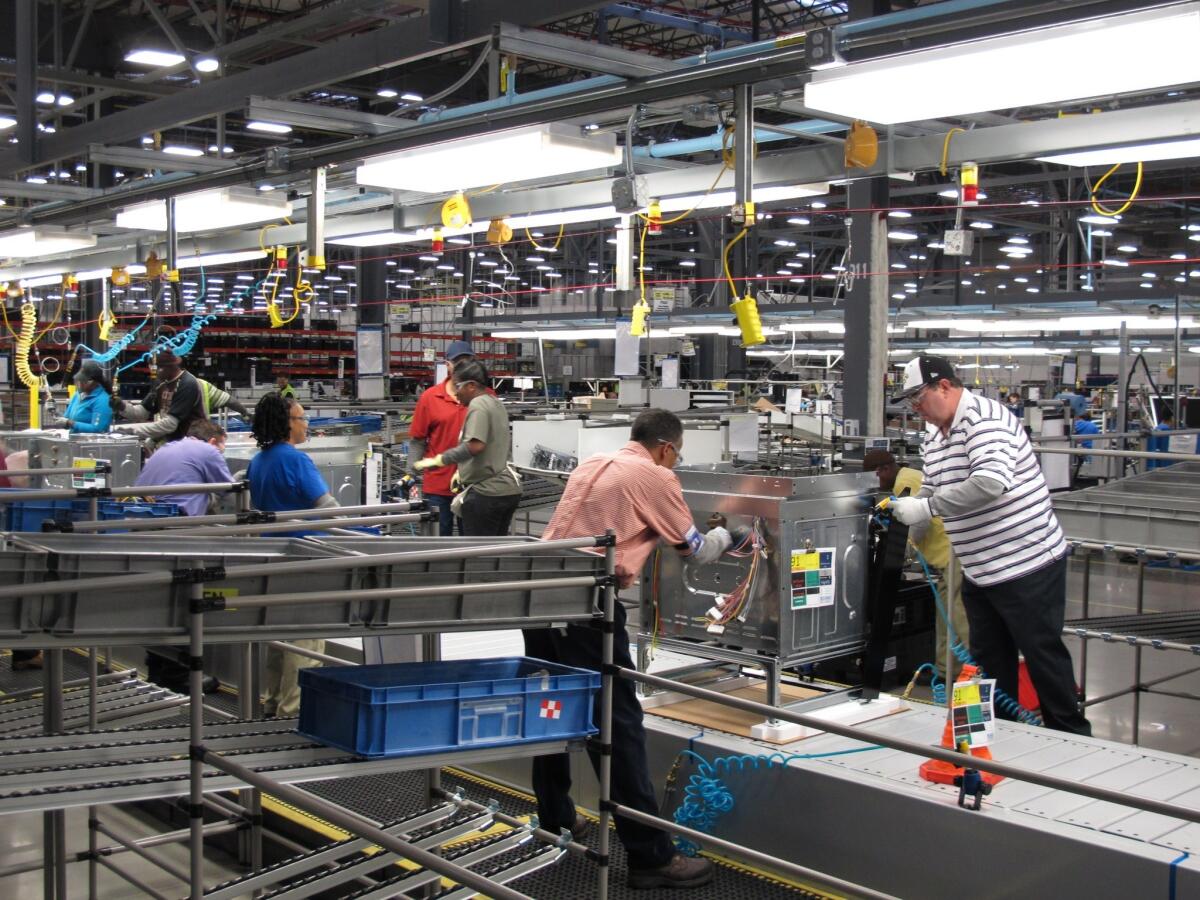Column: Trump is killing U.S. manufacturing

- Share via
U.S. manufacturers must be asking themselves just now: If President Trump is our friend, what would an enemy look like?
That’s the question raised by the latest statistic on the manufacturing economy, the Institute for Supply Management’s purchasing managers index for August, released Tuesday.
The index, in which a figure below 50 indicates that manufacturing is contracting, unexpectedly fell to 49.1. That’s down from 51.2 in July — the first decline in 35 months.
If the president and his economic advisors aren’t now nervous about the outlook, they should be.
— Ian Shepherdson, chief economist at Pantheon Macroeconomics
The gloom may be spreading. Comments by the ISM’s panel of purchasing executives “reflect a notable decrease in business confidence,” the institute said.
There was general agreement among economists on where to point the finger: at President Trump and his trade conflict with China.
“Blame the trade war,” remarked Ian Shepherdson, chief economist at Pantheon Macroeconomics, who earlier had blamed weakening manufacturing data on “the weakening of China’s economic cycle, rather than the trade war. Now, however, the balance appears to be shifting.”
Quarterly GDP report shows that the sugar high of tax cuts wasn’t sustainable.
The index of new export orders for American companies, an electrocardiogram of trade health, fell to 43.3 in August, the ISM reported, 4.8 points down from July and the lowest reading since April 2009, when it bottomed at 42.9.
Shepherdson warned that, without a quick turnabout in administration trade policy, there’s little hope of a sudden recovery in manufacturing, such as what happened in 2009, when the recession-related credit crunch ended. The manufacturing data don’t yet presage a recession, he wrote, but “if the president and his economic advisors aren’t now nervous about the outlook, they should be.”
Trump built much of his 2016 presidential campaign on a promise to increase manufacturing jobs in the United States. He blamed shrinkage in the manufacturing sector on trade agreements such as NAFTA and the policies of the Chinese, and took credit when an American manufacturer agreed to create or save jobs in the United States. Many of those arrangements, however, turned out to be exaggerated or bogus, or predated Trump’s claim. Some disappeared as soon as public attention turned elsewhere, or were outweighed by job cuts made elsewhere by the same companies.
We’ll say this for President Trump: When he misunderstands something, he misunderstands it more than anyone else in creation.
Manufacturers today are worried about a contraction in new export orders and to the cost of moving manufacturing out of China to circumvent the Trump tariffs, the ISM says. “Trade remains the most significant issue,” the institute reported. “Overall, sentiment this month declined and reached its lowest level in 2019,” says Timothy R. Fiore, chair of ISM’s manufacturing survey committee.
One reason that experts aren’t yet connecting the trade war directly to the prospects of a recession is that manufacturing accounts for about 11% of the U.S. economy. Nor does the ISM report show that higher tariffs imposed by Trump on Chinese goods have yet translated into “upward price pressures or materials shortages,” according to Bloomberg Chief U.S. Economist Carl Riccadonna.
He observed that “second-order impacts from the tariffs (i.e. confidence effects and currency appreciation) appear to be having the more substantial impact.” That’s not a positive development, since a fall in confidence could percolate into the economy at large.
That may already be showing up in new light vehicle sales in August. Those figures will be reported Wednesday and are expected to show the third straight monthly decline since they peaked at a seasonally-adjusted annualized rate of 17.4 million in May.
More to Read
Inside the business of entertainment
The Wide Shot brings you news, analysis and insights on everything from streaming wars to production — and what it all means for the future.
You may occasionally receive promotional content from the Los Angeles Times.











